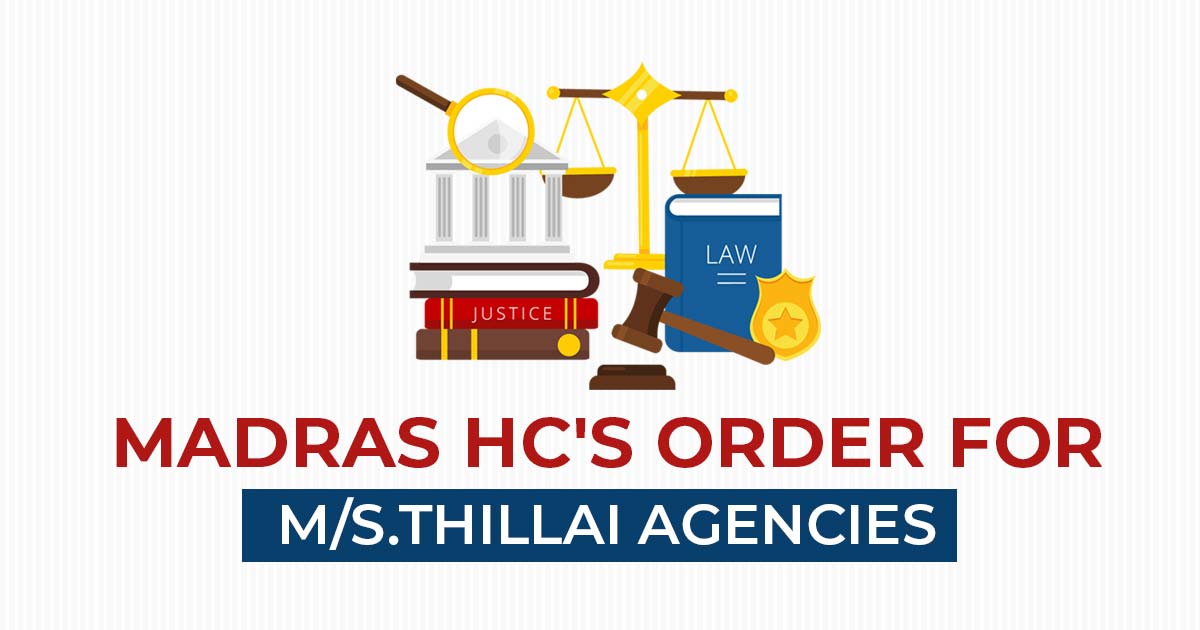
If an enrolled dealer availed for any advantage under Section 19 of the TNVAT Act 2006 then he needed to comply with the norms mentioned in the stated section, Madras High Court ruled.
The applicant did not deliver the original tax invoice from a registered dealer, and thus, he is unable to complain that the authorities are trying to reverse the input tax credit in his favour, the bench of Justice D. Krishnakumar and Justice R. Vijayakumar has marked. The applicant has affected the purchase 5 months post registration cancellation of the selling dealer.
As the enrollment of the selling dealer was cancelled in April 2008, he doesn’t have filed the tax. Hence the applicant’s allegations that the notice issued via the respondent department for ITC reversing amounts to double taxation is not legally sustainable.
The applicant is an enrolled dealer in mobile phones, and he purchased Nokia mobile phones via an authorized wholesale dealer, namely M/s Smart Trading Company, Madurai, in September 2008. The applicant had filed monthly returns in Form-I in September for the AY 2008-2009 and availed the input tax credit for the purchase.
A notice has been issued by the respondent/department suggesting to reverse the input tax credit that the petitioner claimed to the tune of Rs. 1,04,673 for September 2008 on the foundation that the cancellation of registration of the selling dealer had already taken place.
The applicant argued, according to Section 19(10)(a) of the Tax Value Added Act, 2006, that the prerequisite levied to avail of the input tax credit is to produce the original tax invoice.
In this case, the petitioner had provided the original tax invoice issued by the wholesale dealer, namely M/s Smart Trading Company Madurai but the authorities did not accept it on the ground that the registration of the selling dealer was already cancelled and was not subsisting on the date at the time of when the petitioner had made the purchase.
it is incomprehensible to verify the validity or subsistence of the registration of the selling dealer, the applicant argued. The applicant is a bona fide purchaser. If the ITC is reversed, the tax paid for the purchase effected by him will result in damages under Section 40. As a result of the provision, for a single transaction, a tax shall be charged at two points, which is opposite to the object of the Tamil Nadu Value Added Tax Act, 2006. The provision breaches the Articles 14 and 301 of the Constitution of India.
On April 21, 2008, the registration of the wholesale dealer cancelled itself, and the petitioner is said to have purchased from the said wholesale dealer in September 2008, the department argued. The seller dealer is non-existent, and the assessing authority asked to reverse the ITC claim to the extent of Rs. 1,04,673 under Section 19(16) of the TN VAT Act 2006 by an audit notice.
The audit notice issued dated March 11, 2009, shall not amount to double taxation, because the wholesale dealer (whose registration has been cancelled) has not paid any tax at all, as contended by the department. When the applicant asks to take advantage of Section 19 of the TNVAT Act 2006, he is tied to comply with prerequisites levied under the section for claiming the input tax credit. The applicant did not proceed to send any reply to the notice, and rather, he filed the writ petition contesting Section 19(15) of the Tamil Nadu Value Added Tax 2006 as unconstitutional and unenforceable.
A combined reading of Section 19(15) and Section 40 shows that to claim the ITC, a registered dealer needed to file the original tax invoice of the sale proving the Input tax amount, and in cases in which the enrollment certificate of selling dealer is cancelled via the relevant heads, the purchasing dealer who claimed the GST Input Tax Credit (ITC) will need to file the amount claimed on the date from which the cancellation order of registration certificate tax came into force. While the purchasing dealer will be obligated to pay the interest. An unregistered dealer from collecting any amount through the way of tax is been prohibited by Section 40.
The court ruled that despite the applicant having contested the constitutional validity of fiscal legislation, neither the foundations nor the submissions incurred on the side of the writ applicant stated the breach of any constitutional provisions. Only for coming on the proceedings that the respondent authorities initiated for the ITC reversal the writ petition has been filed.
| Case Title | M/s.Thillai Agencies Vs. Assistant Commissioner |
| Citation | W.P(MD).No.12333 of 2009 and MP(MD).No.1 of 2009 |
| Date | 24.01.2024 |
| Petitioner by | Mr.J.Pooventhera Rajan |
| Respondent by | Mr.N.Satheeshkumar |
| Madras High Court | Read Order |